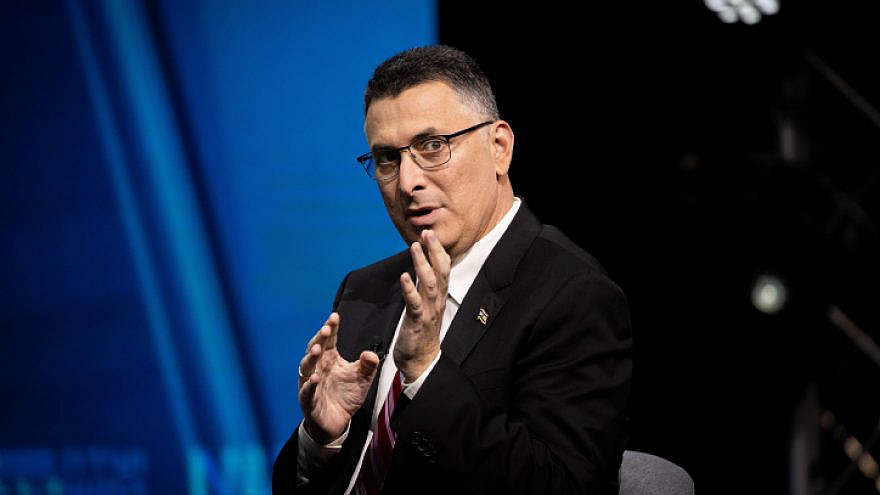New Hope Party leader Gideon Sa’ar comes to Tuesday’s general election far from the position he’d hoped. He has dropped from second place in the polls at the start of the campaign, with nearly 20 projected seats, to fourth, with about half as many.
The original plan was for him to become prime minister, with New Hope rather than the Likud at the center of a right-wing, religious coalition. The other plan was to prevent Prime Minister Benjamin Netanyahu from forming the next government and forcing an alternative government by bringing in the haredi parties. Now that Yamina leader Naftali Bennett has overtaken him and Netanyahu is nearing the 61 seats he needs to form a government, Sa’ar’s hand is looking less good.
Q: But your goal was to replace Netanyahu, and according to the polls at least, you aren’t achieving it.
Q: Based on the polls, is there a realistic scenario for a coalition of the national camp without Netanyahu as leader?
A: In the event that Netanyahu can’t form a government, and can’t enlist 61 seats, I call on him to release the Likud and the country and do the patriotic thing and allow someone else from the Likud to lead. That would easily allow the formation of a broad government that can meet all the challenges facing Israel at this time.
Q: You are calling on him to step down, but you know that won’t happen.
A: I don’t want to make predictions about what will happen after the election.
Q: Are there quiet conversations or understandings between you and Bennett about the day after the election?
A: As of today, no. But I assume that later on, there will be a dialogue like that. Sadly, Bennett still hasn’t demonstrated commitment to change and he is laying the groundwork for joining another Netanyahu government. But if Bennett is committed to change for Israel, there will be cooperation, and he’ll be a good partner. I will never join a Netanyahu government.
Q: Even if that means a fifth election?
A: That’s a very manipulative way of putting it. Netanyahu is directly responsible for Israel holding a fourth election in under two years, which have so far cost 15 billion shekels [$4.5 billion]. He is the sole person who led Israel into this situation and he is the only one who can release it from it. Netanyahu had a coalition of 70 MKs but he avoided passing a budget and dragged Israel into an election because he preferred what was best for himself. So it’s ridiculous to present things as if someone else is responsible for the election when it’s clear that it’s him. I don’t trust him. His words or any agreements with him are worthless.
Q: I hear your harsh criticism of Netanyahu, and I conclude that to avoid a fifth election, you’d prefer a government under Lapid, just as long as Netanyahu is out.
A: Not at all. I’ve already said that such a government would be unfeasible and I won’t recommend Lapid to the president. A government can’t rest on a party that represents a minority of the public, [and] which will be a minority in the next Knesset, too. After the election, the people who believe in change need to organize, and I hope that Yamina will join us and we will work to form a government. In a situation in which Netanyahu manages to form a government with his partners and Bennett, we will serve the people from the opposition.
Q: Which begs the question, if you don’t succeed in replacing Netanyahu, will you stay in politics and not resign from political life again?
A: Certainly not. I founded a new political movement that just got started. It is already putting down roots. It has support everywhere in Israel. I have no intention of resigning, and I can already see the fingerprints of the person who is spreading those false rumors. True, I took a break, but I came back to serve the people, and I can say that I’ll do so until I’m 70 at least. I chose my path, which isn’t easy or simple, because I believe that these are the right decisions for the country. I see a large part of the public following me, and I’ll continue.
Q: To sum up, Netanyahu says that he got the vaccines because he is well-known throughout the world. Speaking honestly, can you say he’s mistaken, or that you would have achieved the same results?
A: He deserves praise for that success. But the success doesn’t make him less responsible for the total failure in managing the COVID crisis, in enforcing the law, the problem of the airport, which had serious ramifications on the spread of the virus and mortality, the school system and businesses. I don’t take any credit from him when it’s deserved, but it’s appropriate for a leader to know how to not only take credit for success—which has partners—but also not to blame others when there are failures.”
Q: Would you have managed the crisis better?
A: I have no doubt I would have handled it better.


























